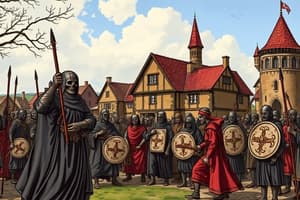Podcast
Questions and Answers
What is the general timeframe of the Middle Ages in Europe?
What is the general timeframe of the Middle Ages in Europe?
- 600s to 1500s CE
- 500s to 1400s CE (correct)
- 200s to 1000s CE
- 400s to 1200s CE
What is associated with the Medieval Period or the Middle Ages?
What is associated with the Medieval Period or the Middle Ages?
- Slower economic and scientific development (correct)
- Peaceful religious coexistence
- Decline of feudalism
- Rapid economic and scientific progress
When is the end of the Middle Ages generally marked?
When is the end of the Middle Ages generally marked?
- The spread of the plague
- The Renaissance of the 1400s (correct)
- The rise of feudalism
- The fall of the Western Roman Empire
What was the primary motivator for many men to join the Crusades?
What was the primary motivator for many men to join the Crusades?
What was the impact of the Crusades on the Eastern Roman Empire?
What was the impact of the Crusades on the Eastern Roman Empire?
What was the defining social organization of the Middle Ages?
What was the defining social organization of the Middle Ages?
What was the impact of the Black Plague on the labor conditions of the serfs?
What was the impact of the Black Plague on the labor conditions of the serfs?
Which event marked the founding of the University of Oxford?
Which event marked the founding of the University of Oxford?
What significant historical development was instigated by the Pope?
What significant historical development was instigated by the Pope?
What was a pivotal event that laid the foundations of scholasticism in the Middle Ages?
What was a pivotal event that laid the foundations of scholasticism in the Middle Ages?
Flashcards are hidden until you start studying
Study Notes
Key Events of the Middle Ages
- The Early Middle Ages (476-1000 CE) saw the fall of the Western Roman Empire, the rise of Islam, and the creation of the Holy Roman Empire in northern Europe.
- Significant events included the fall of the Western Roman Empire in 476, the publication of the Code of Civil Law by Eastern Roman Emperor Justinian I, and the founding of Islam by Muhammad in 610.
- The High Middle Ages (1000-1300) witnessed the growth of academic learning, the development of scholasticism, the instigation of the Crusades by the Pope, and the significant growth of feudalism.
- Key events included the invasion of England by William the Conqueror in 1066, the split between the eastern and western churches in 1054, and the founding of the University of Oxford in 1117.
- The Late Middle Ages (1300-1492) were characterized by warfare, the Black Plague, and the rise of the Renaissance. Key events included the Hundred Years' War beginning in 1337, the devastating Black Death in 1347, and the invention of the printing press by Johannes Gutenberg in 1439.
- The Middle Ages saw the rise of key institutions and powers, with the Catholic Church playing a significant role in European politics and the crowning of Charlemagne as the first Holy Roman Emperor marking a pivotal event.
- The rise of Islam and the Crusades were also pivotal, with the emergence of Islam as a dynamic force and the Pope's instigation of the Crusades leading to significant historical developments.
- The power of the Pope was influential, as he crowned new emperors, turned kings against each other, and called for wars, while also having the ability to excommunicate those who opposed him.
- The crowning of Charlemagne in 800 CE as the first Holy Roman Emperor by the Pope marked a significant event that laid the foundations of scholasticism in his empire.
- The rise of Islam brought a new dynamic force to the east, with Muhammad successfully unifying the Arabian Peninsula and launching a wave of conquest continued by his successors.
- The Middle Ages were characterized by dynamic developments and new institutions, with the Catholic Church and the rise of Islam playing pivotal roles in shaping the historical landscape.
- The Middle Ages were far from a period of stagnation, with the emergence of new institutions, powers, and knowledge, and the pivotal role played by the Catholic Church and the rise of Islam in shaping the historical narrative.
Studying That Suits You
Use AI to generate personalized quizzes and flashcards to suit your learning preferences.




